Story republished from The Labari Journal
On January 31, 2025, Ghana’s Minister of Communications, Digital Technology and Innovation, Samuel Nartey George, made a bold promise: In four years, Ghana will become the centre and the hub of Artificial Intelligence (AI).
“We’re going to take the current AI strategy developed by the previous government, review it and make it fit for purpose,” he told the Appointments Committee of Parliament at his ministerial vetting in Accra.
Mr George said the current government would engage industry and ensure that Ghana became the hub of AI on the continent.
For the past few years, AI has become a major trend globally. Countries like the US and China are spending heavily to invest in AI development, including the manufacturing of chips to aid in AI processing.

While artificial intelligence continues to make global headlines, much of its advancement still fails to speak—literally—to the majority of African populations.
One of the many challenges in adopting AI in Africa is using it to process local languages.
For AI researcher and developer, Dr. Paul Azunre, co-founder of Ghana NLP, building natural language processing (NLP) systems for Ghanaian languages has been less about technical constraints and more about confronting systemic inequities.
We conducted a written interview with Dr. Azunre to get his views on AI in Africa and his work at Ghana NLP.
The Real Cost of Open Source
When it comes to the work that Ghana NLP does, Dr. Azunre says one of the major hurdles is financial.
“The biggest challenge is the lack of funding to compensate people to treat this as a consistent gig,” he said.
“A lot of the time, when it comes to African languages, foreign corporations, foundations, and other entities are surprised when the subject of compensation is brought up.“
According to Dr. Azunre, foreign corporations and foundations often balk at the idea of paying contributors in Africa.
“A lot of entities – Meta comes to mind – use “Open Source” as a trick to try and extract data, effort and other contributions from developers as a ‘thank you’ for including us in their models etc – which are consistently of questionable quality for our languages.

Dr. Azunre says many tech giants promote open source ideals as a way to extract value from under-resourced regions.
Maybe it is because they [corporations] don’t understand that Open Source might work in the West – because developers are well compensated and have disposable income and time”, he stated.
“That is not how it works in Africa, but all of the above choose to conveniently ignore this reality for the sake of their bottom line.“
Entities like Meta, he argues, often frame their initiatives as altruistic, while failing to acknowledge or address the power imbalance.
“If you ask some of the people who are asking you to work for free on these projects, what their compensation is, it is high enough to make the head of a Ghanaian spin in awe. Obscene structural inequality.“
“Even after Big Tech moved in after we opened up the market, we still have greater coverage and most of the time, significantly better performance. Achieving this literally with zero resources compared to them is impressive.”
Dr. Paul Azunre
Ghana’s Lingual Puzzle
Translating local languages in Africa with AI is complex.
From Dr. Azure’s perspective, Ghana’s unique position complicates things further.
Ghana is a relatively small African country with astounding Lingual diversity means any one language won’t have that many speakers”, he said.
While countries like Nigeria, Kenya, and South Africa often receive priority, Ghana’s complex linguistic landscape demands targeted effort with relatively fewer resources.

Still, Dr. Azunre’s team has managed to develop the world’s first machine translation and speech systems for languages like Twi, Ewe, Ga, Dagbani, Gurene, and even Kikuyu from Kenya.
And they built it with fewer resources than their international counterparts.
“Even after Big Tech moved in after we opened up the market, we still have greater coverage and most of the time, significantly better performance.
Achieving this literally with zero resources compared to them is impressive.”
Data Quality Over Quantity
When asked about sourcing data and ensuring authenticity, Dr. Azunre says his approach is community-driven.
This is an issue that comes up all the time.”, he acknowledged.
He emphasized that high-quality data usually results in smaller volumes, but it’s better compared to what corporations do when they automatically scrape large volumes of data.
“If you do it by centering the humans and communities, it is actually not as much data for most of the problems we care about – such as translation, speech recognition, and generation.“
Working with Local Experts
The experience of working with native speakers for Ghana NLP’s work has been overwhelmingly positive according to Dr. Azunre.
“It has been mostly great,” he noted. “Ghana has a lot of talent willing and able to contribute in this space.
You just have to make sure you give them what they need – such as internet data and devices to do their recording and analysis.”
Unfortunately, he says local institutional support is still lacking.
“Our governments are also yet to meaningfully contribute or help such efforts, leaving the onus pretty much on a few well-meaning individuals to keep pushing things along,” he said.

Despite that, the impact of the work being done has been far-reaching.
“Doctors are using our tools in remote communities to help patients, teachers are using our tools to inspire the youth and introduce AI to them, entire startups are currently being built on top of our APIs – across Africa, not just in Ghana.“
Against The Odds
Despite all the work being done and their accomplishments, Dr. Azunre says they have not benefited financially. For the past ten years, he says he can’t boast of large financial gains.
Regardless, he’s happy to see that the work Ghana NLP is doing speaks for itself.
“We have shown that it is possible to stand in an environment of greed, exploitation, corporate and government corruption on your own two feet, defy those precarious odds and still make a meaningful impact on the community,” he said.
“Not all of these movements will give us credit for this, but credit is not why I do this, so I am perfectly fine with that,” he added.
What’s Next
Looking ahead, Dr. Azunre sees opportunities in building practical, commercial tools—apps that solve urgent local problems.
But he’s urging African AI developers to think beyond the Silicon Valley hype.
“We as Africans must also look into our unique situation and see where we can diverge from the “AGI”-delusion driven excesses of Silicon Valley,” he says.
“We need to build more efficient, smaller offline models, and thereby advance humanity as a whole by contributing something very different to the AI knowledge pool“.
Paul says his team at GhanaNLP is already working toward this goal.
“I won’t say much more—but stay tuned.”










